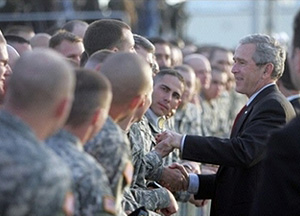 |
 |
 |
 Editorials | Issues | January 2007 Editorials | Issues | January 2007  
Breaking Ranks: US Troops Call for Iraq Withdrawal
 Charles E. Anderson - t r u t h o u t Charles E. Anderson - t r u t h o u t


| | President George W. Bush shakes hands with US soldiers at Fort Benning in Georgia. Despite palpable frustration in Washington with the government in Baghdad, the under-fire Bush administration is refusing to contemplate a Plan B, should its long-odds new strategy fail to pacify Iraq. (AFP/Tim Sloan) |
On Wednesday, January 10, President George W. Bush announced that he would be sending 21,500 more troops to Iraq as early as Monday. "The escalation of this war is very disappointing," said Mass Communications Specialist Third Class, Jonathan Hutto, 29, a sailor stationed aboard the aircraft carrier Theodore Roosevelt. Ironically, as the additional troops begin arriving in Iraq Monday morning, Hutto and other active duty troops will hold a press conference at a church in Norfolk. On Tuesday morning, the group will travel to Washington to present the Appeal for Redress of Grievances from the US Congress to US Representative Dennis Kucinich.

The Appeal for Redress of Grievances, which relies on whistleblower protection laws, calls for "the prompt withdrawal of all American military forces and bases from Iraq" and represents the first organized active-duty military movement to oppose the war and occupation of Iraq since Vietnam. To date, over 1,000 active-duty members of the US military have signed it. While signers of the appeal span the ranks from private to rear admiral, the average signatory is a corporal or sergeant and has completed at least one tour of duty in Iraq. "These [service members] are your basic typical young Americans," says Hutto. In fact, the signatories of the appeal are as varied as the backgrounds of all men and women in the military. "Some of them have college experience; some of them don't. Some of them came straight out of high school. Some of them worked some common jobs," Hutto observes. But he goes on to say, "That's what a mass movement is. A mass movement is people that all come from different walks of life, different thinking and whatnot. But the central theme is that what is taking place in Iraq is not working, and we have got to find a different solution."

Hutto readily identifies himself first as a patriotic sailor on duty, but off duty "officially citizen sailor." His personal story is really no different from that of the thousands of men and women currently serving in the armed forces. He graduated from Howard University with a bachelor's degree in political science and began a career teaching grade school in Maryland. But Hutto "did not find much success." Unemployed and facing more than $40,000 in student loans, he sought out a navy recruiter. Though he had a substantial background in activism, Hutto did not expect to organize within the military itself. That changed shortly after he joined the navy, when one of his former professors sent him a copy of David Cortwright's Soldiers in Revolt, a book that profiles active duty resistance to the Vietnam War. Hutto says it was after reading the book that he came to believe "there is no contradiction ... between serving out your duty and having a questioning attitude towards those orders [and] those directives that are given down from your chain of command, especially as it pertains to war, especially as it pertains to this current occupation, especially as it pertains to how resources are allocated in our society."

When asked what changed his mind about the Iraq War, Hutto replies that there is an assumption that service in Iraq is the primary reason young people join the military today. "That is not the case," he says, "That is not the overriding issue as to why men and women join the military today. The overriding issue is not raw patriotism, although I am not going to say that the people in the military are … unpatriotic, they are proud of [their] country. But the overriding issue is one of economics. It is one of sustainability. It's being in a society where there are not enough resources, where there is not a right to education and job security. For a lot of these young people in the military it is a way out." Hutto is not alone. As few as thirty-five percent of Americans support the war. It is not surprising that support for the war within the military is declining.
Charles E. Anderson served in Iraq with the Marine Corps' Second Tank Battalion during the invasion of Iraq. During his nine-year career, he served in infantry, armor, and medical units. He lives in Hampton, Virginia, where he is a World Studies student at Thomas Nelson Community College. He can be contacted through his website at http://www.charleseanderson.com. | 
 | |
 |



